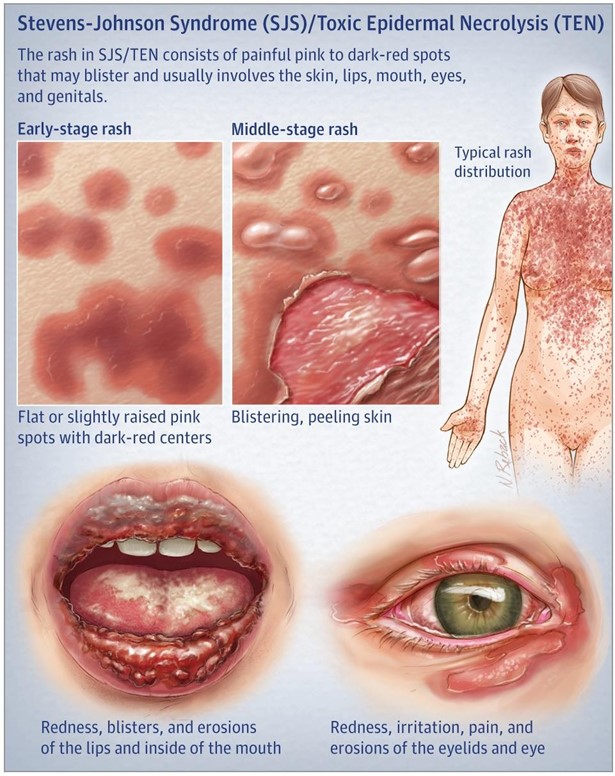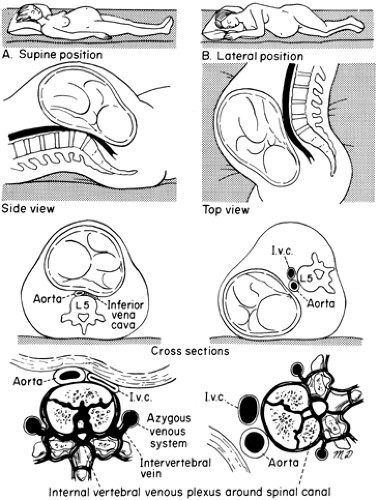A nurse is reinforcing teaching with a client who is taking allopurinol about the risk for developing Stevens-Johnson syndrome.
For which of the following manifestations should the nurse instruct the client to monitor and report?
Tinnitus with ear pain
Hyperreflexia
Skin rash with fever
Diplopia
The Correct Answer is C
Explanation
C. Skin rash with fever
Stevens-Johnson syndrome (SJS) is a severe and potentially life-threatening hypersensitivity reaction that can occur as a rare side effect of certain medications, including allopurinol.
Monitoring and early recognition of SJS symptoms are crucial for prompt medical.
Skin rash with fever is a hallmark manifestation of Stevens-Johnson syndrome. It often starts with flu-like symptoms such as fever and malaise, followed by the appearance of a widespread, painful, and rapidly progressing rash. The rash typically involves the mucous membranes, including the mouth, nose, and eyes, and can be accompanied by blisters or sores. Prompt reporting of these symptoms is critical for early diagnosis and intervention.
Tinnitus with ear pain in (option A) is incorrect because it is not typically associated with Stevens- Johnson syndrome. It may indicate another condition or side effect unrelated to SJS.
Hyperreflexia, which refers to abnormally increased reflexes, in (option B) is incorrect because it is not a characteristic manifestation of Stevens-Johnson syndrome. It may indicate a neurological condition or reaction to another medication, but it is not specific to SJS.
Diplopia, or double vision, in option (D) is incorrect because it is not commonly associated with Stevens- Johnson syndrome. It may be caused by other ocular or neurological conditions.
In summary, the nurse should instruct the client taking allopurinol to monitor and report the manifestation of a skin rash with fever. This is important because it may indicate the development of Stevens-Johnson syndrome, a severe and potentially life-threatening reaction to the medication. Early recognition and medical intervention are crucial to minimize complications and ensure appropriate treatment.

Nursing Test Bank
Naxlex Comprehensive Predictor Exams
Related Questions
Correct Answer is B
Explanation
The client's symptoms of feeling dizzy, having a racing heart, and becoming pale while lying on their back are consistent with supine hypotension syndrome, also known as vena cava syndrome. This occurs when the weight of the uterus compresses the inferior vena cava, reducing blood flow and causing symptoms.
To address this issue, the nurse should Position the client on their left side. Lying on the left side helps relieve the pressure on the inferior vena cava and improves blood flow. This can alleviate the symptoms and prevent further complications.

Instructing the client to take a brisk walk is not appropriate in this situation, as it may exacerbate the symptoms by increasing heart rate and potentially causing further dizziness or fainting. Checking the client's temperature is not necessary in relation to these symptoms, as they are not indicative of a fever or infection.
Providing the client with a glass of orange juice may be helpful in some situations, such as if the client is experiencing hypoglycemia. However, in this case, the symptoms are likely due to supine hypotension syndrome, and repositioning the client is the priority intervention.
Correct Answer is B
Explanation
Splinting the incision with a pillow when changing positions can provide support and help minimize discomfort and pain in clients who have undergone a cesarean birth. It can help reduce strain on the incision site and provide a sense of stability and comfort.
"You can apply counterpressure to your back with each position change" may be helpful for managing back pain, but it does not specifically address the client's request for nonpharmacological interventions to manage pain when changing positions after a cesarean birth.
"You should change positions as little as possible" is not an appropriate response as it does not address the client's need to manage pain when changing positions. Encouraging movement and position changes, along with appropriate support, can aid in recovery and prevent complications such as blood clots and respiratory issues.
"You should use patterned-paced breathing when changing positions" is not specifically related to managing pain when changing positions after a cesarean birth. While breathing techniques can be useful for pain management during labor and certain procedures, it may not be the most effective strategy for managing pain when changing positions post-cesarean.
Whether you are a student looking to ace your exams or a practicing nurse seeking to enhance your expertise , our nursing education contents will empower you with the confidence and competence to make a difference in the lives of patients and become a respected leader in the healthcare field.
Visit Naxlex, invest in your future and unlock endless possibilities with our unparalleled nursing education contents today
Report Wrong Answer on the Current Question
Do you disagree with the answer? If yes, what is your expected answer? Explain.
Kindly be descriptive with the issue you are facing.
